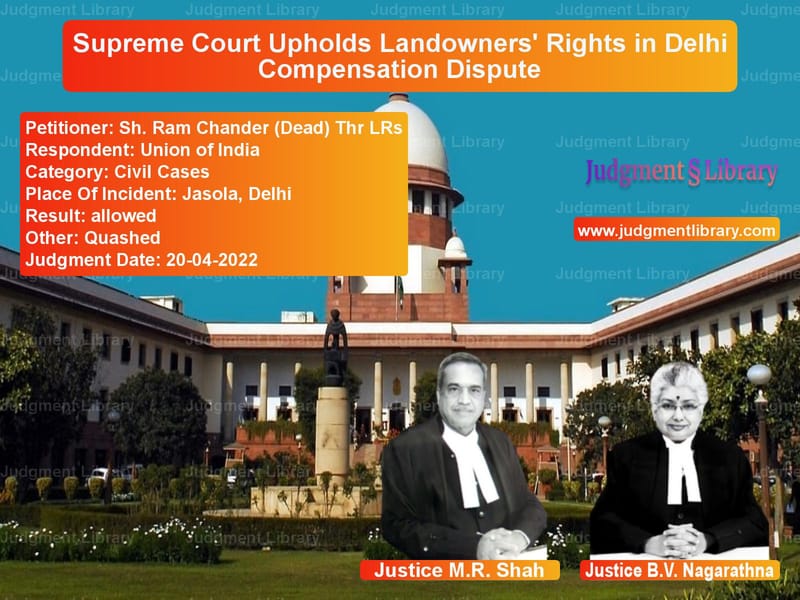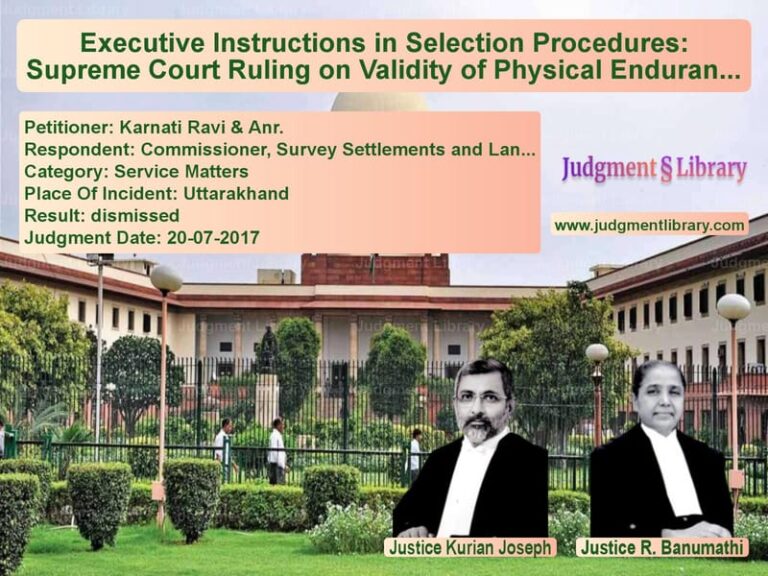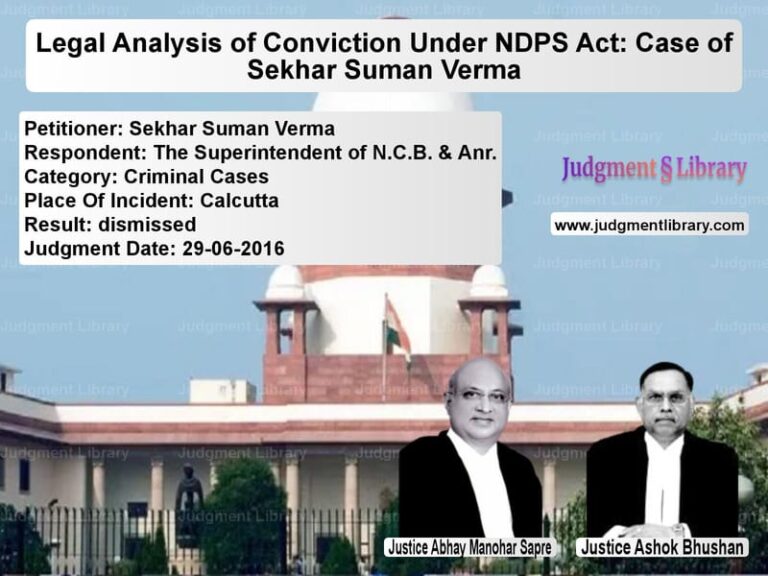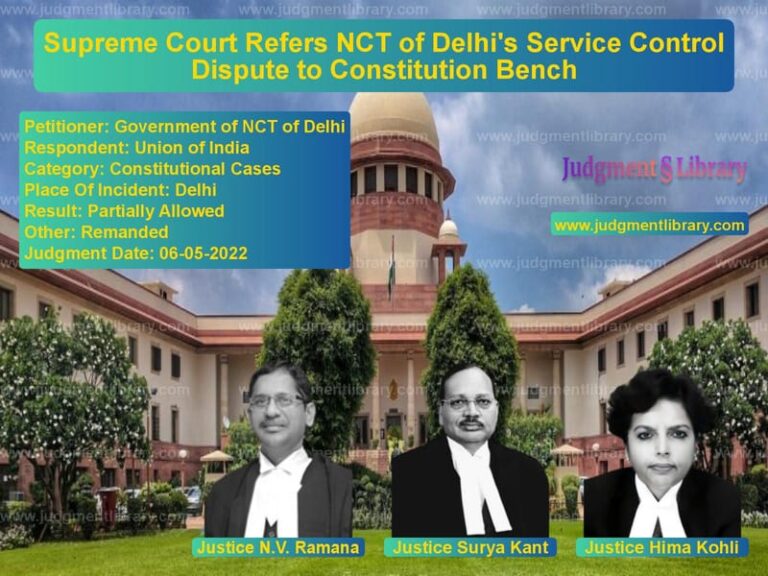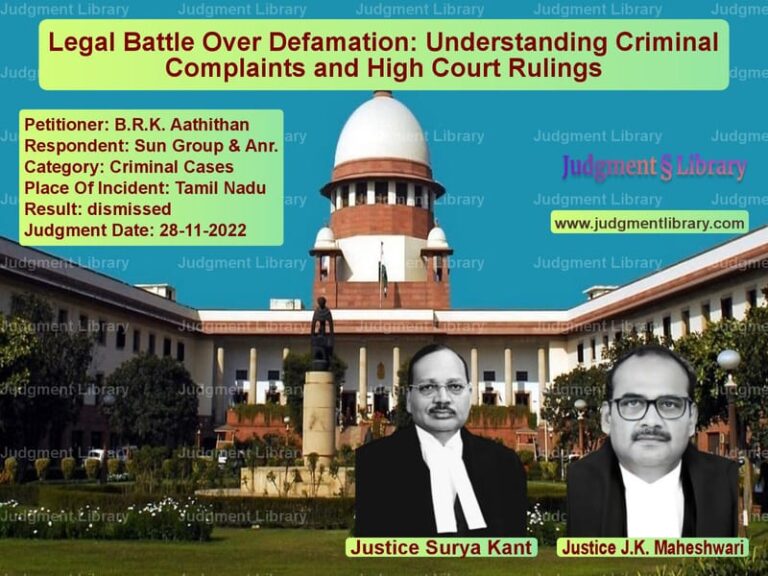Supreme Court Upholds Landowners’ Rights in Delhi Compensation Dispute
The case of Sh. Ram Chander (Dead) Thr LRs vs. Union of India revolves around a prolonged land acquisition and compensation dispute that spanned multiple decades. The dispute arose due to the acquisition of land in Jasola, Delhi, and the valuation of compensation under the Land Acquisition Act, 1894. This judgment is crucial as it clarifies the implications of legal precedent, review petitions, and delays in appeals.
Background of the Case
The dispute originates from a notification under Section 4 of the Land Acquisition Act, 1894, for acquiring land owned by the appellants. The Land Acquisition Officer initially awarded compensation of Rs. 3500 per bigha. However, upon challenge, the Reference Court enhanced the compensation to Rs. 22,000 per bigha on May 3, 1986. Subsequently, the Delhi High Court increased the compensation to Rs. 2240 per sq. yard in a judgment dated October 19, 2001, relying on its ruling in the case of Bhola Nath vs. Union of India.
Legal Challenges and Review Petitions
The Bhola Nath judgment had a significant impact on land compensation cases in Delhi. The Union of India had challenged the Bhola Nath judgment before the Supreme Court, but its Special Leave Petition (SLP) was dismissed in 1999. However, the Delhi Development Authority (DDA), which was a beneficiary in the Bhola Nath case, successfully challenged it in 2010. The Supreme Court set aside the earlier ruling and remanded the matter back to the Reference Court. Upon re-examination, the Reference Court initially set the compensation at Rs. 250 per sq. yard, which the Delhi High Court later revised to Rs. 2000 per sq. yard in 2016.
Meanwhile, in 2007, the Union of India filed an SLP against the 2001 High Court ruling regarding the present landowners. However, since the petition was filed after a delay of 2316 days, the Supreme Court dismissed it. Following the Supreme Court’s ruling in the Bhola Nath case, the Union of India then filed a review petition before the Delhi High Court, seeking to set aside the 2001 ruling. The High Court granted the review, overturning its previous decision and bringing the compensation issue back into dispute.
Arguments Presented
Petitioner’s Arguments
- The petitioners, representing the original landowners, contended that the High Court’s 2001 judgment was final and binding, and that the review petition was filed unjustifiably.
- They emphasized that the Supreme Court had already dismissed the Union of India’s SLP due to the excessive delay, rendering any further review untenable.
- They argued that since the High Court had reaffirmed its stance on compensation in 2016, and the Supreme Court had dismissed the appeal against it in 2017, there was no legal ground to alter the compensation set in 2001.
Respondent’s Arguments
- The Union of India argued that the 2001 High Court ruling was based on the Bhola Nath case, which had been subsequently overturned by the Supreme Court in 2010.
- They contended that since the Bhola Nath decision had been nullified, any ruling based on it, including the present case, should also be reconsidered.
- They justified the filing of the review petition by claiming that they acted as soon as they became aware of the Supreme Court’s 2010 decision.
Supreme Court’s Judgment
The Supreme Court, with Justice M.R. Shah and Justice B.V. Nagarathna presiding, ruled against the review petition and upheld the High Court’s 2001 judgment. The bench observed:
“The review application was allowed on the assumption that the Bhola Nath case had been set aside, but subsequent developments had already reaffirmed the compensation at Rs. 2000 per sq. yard, making the review unnecessary.”
The Supreme Court ruled that the High Court’s decision to recall its 2001 judgment was legally flawed, stating that the subsequent ruling in the Bhola Nath case had already validated the compensation figures in question.
Read also: https://judgmentlibrary.com/supreme-court-rejects-review-petition-in-specific-performance-suit/
Key Takeaways from the Ruling
- The Supreme Court set aside the High Court’s review orders dated May 12, 2017, and July 7, 2017.
- The 2001 High Court ruling on compensation was reinstated, ensuring that the original landowners would receive Rs. 2240 per sq. yard.
- The government was ordered to pay the compensation within twelve weeks, including all statutory benefits.
Conclusion
This ruling is significant as it highlights the importance of legal finality in compensation matters. The Supreme Court reaffirmed the principle that review petitions cannot be used as a backdoor mechanism to overturn long-standing judgments, especially when they have been reaffirmed through subsequent judicial proceedings.
The decision marks a major victory for landowners in Delhi, setting a precedent for similar cases in the future. It also serves as a cautionary tale for government bodies regarding the timely filing of legal challenges to prevent unnecessary litigation.
Petitioner Name: Sh. Ram Chander (Dead) Thr LRs.Respondent Name: Union of India.Judgment By: Justice M.R. Shah, Justice B.V. Nagarathna.Place Of Incident: Jasola, Delhi.Judgment Date: 20-04-2022.
Don’t miss out on the full details! Download the complete judgment in PDF format below and gain valuable insights instantly!
Download Judgment: sh.-ram-chander-(dea-vs-union-of-india-supreme-court-of-india-judgment-dated-20-04-2022.pdf
Directly Download Judgment: Directly download this Judgment
See all petitions in Property Disputes
See all petitions in Damages and Compensation
See all petitions in Landlord-Tenant Disputes
See all petitions in Judgment by Mukeshkumar Rasikbhai Shah
See all petitions in Judgment by B.V. Nagarathna
See all petitions in allowed
See all petitions in Quashed
See all petitions in supreme court of India judgments April 2022
See all petitions in 2022 judgments
See all posts in Civil Cases Category
See all allowed petitions in Civil Cases Category
See all Dismissed petitions in Civil Cases Category
See all partially allowed petitions in Civil Cases Category

